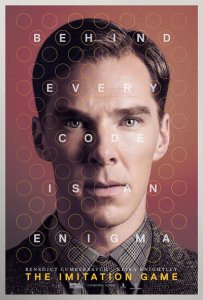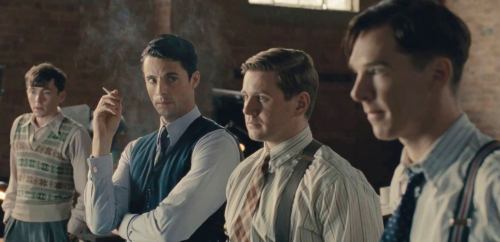 If you know anything about Alan Turing going into The Imitation Game, you will learn nothing new, aside from the bits the filmmakers made up. If you know nothing about Alan Turing, you will learn the basics, along with the bits the filmmakers made up. The filmmakers made up quite a bit. Which isn’t necessarily the worst sin in a bio-pic. Reaching deeper emotional truths often requires altering what “really happened.” Does The Imitation Game reach deeply into emotional truths? They give it a whirl, but stay firmly on the surface.
If you know anything about Alan Turing going into The Imitation Game, you will learn nothing new, aside from the bits the filmmakers made up. If you know nothing about Alan Turing, you will learn the basics, along with the bits the filmmakers made up. The filmmakers made up quite a bit. Which isn’t necessarily the worst sin in a bio-pic. Reaching deeper emotional truths often requires altering what “really happened.” Does The Imitation Game reach deeply into emotional truths? They give it a whirl, but stay firmly on the surface.
The Imitation Game is what one is required to call a “well-mounted production.” In other words, it’s bio-pic Oscar-bait. It looks nice, it’s directed effectively, if unoriginally, and the script is like a paint-by-numbers picture. It’s filled in with care, but there’s not a surprising or unique moment anywhere to be found. Benedict Cumberbatch is excellent as Turing, portraying him as a man who may or not have the mind of a computer, and can’t relate at all to other humans. It’s almost as though his efforts to study humans and learn how to interact with them inspired his work into making machines likewise think like humans. Or so the movie would have as believe, by loudly proclaiming it in every single scene.
There is nothing subtle about The Imitation Game. There is nothing to think about. It’s all right there on the screen and in the dialogue. The issues are spelled out, slowly, underlined, and repeated, over and over again. Which is how these movies are made. I guess we have to accept that this is what high-profile dramas have to be to get noticed and win awards.
The story is framed by Turing’s arrest in ’51 (actually in ’52, but who’s counting) for the crime of being a homosexual. This results in his conviction and his chemical castration (which involves taking hormones to “cure” one’s illegal desires), shortly after which he killed himself. Nice way to treat your heroes, England.
Turing is a hero, of course, for building the first proto-computer, an electrical/mechanical machine, in the successful effort to crack the Germans’ Enigma coding machine. Once broken, the British used just enough of the intelligence gained to beat the Germans without clueing them in to their codes having been cracked. It’s the breaking of the code that makes up the bulk of the movie, intercut with Turing as a young boy struggling at school.
The movie doesn’t even attempt a feeble-movie-explanation of how Turing goes about conceiving of and building his machine (which he names Christopher, after the one friend he had as a child, who died young, which naming is yet another invention of the movie; the machine was actually called the Bombe). He just builds it. Which I guess is fine. The movie’s concern is in showing how Turing has to learn to be human before people will like him and help him. The one woman on his code-cracking team, Joan Clarke (Keira Knightley), explains this to him. They become engaged, despite Turing’s homosexuality.
Three times in the movie we hear the line, “Sometimes it is the people no one imagines anything of who do the things no one can imagine.” I can almost see it written on a poster featuring a cat hanging from a high tree branch.
So on the one hand, Turing is told his strangeness is a plus, but on the other, that unless he conforms, he won’t succeed. The movie goes back and forth between these two messages without seeming to notice that it’s doing so.
The Imitation Game doesn’t dwell on anything long. Scenes come and go as they must. Turing is rude, nobody likes him, but he’s a genius, he’s put in charge. But the machine doesn’t work! The military man in charge, Denniston (Charles Dance), is going to shut it down and fire Turing. But wait! The other men on the team declare that if Turing goes, they go too—“I’m Spartacus!” they may as well shout. And when all seems lost, drinking at the pub, one of the women typists responsible for writing down the indecipherable German codes makes a seemingly innocuous comment to which Turing responds, “What did you say?” It’s the classic aha! moment. Quick! Everybody run to the machine! This just might work! People run a lot in the movie. Else how would we know anything important is happening?
One of the stranger inventions by screenwriter Graham Moore and director Morten Tyldum is to have the British government suspect Turing of being a Russian spy. And worse yet, to have Turing learn of the actual spy in their midst, and not say anything about it, a treasonous act. Nothing like this ever happened. There was in fact a spy in Bletchley Park, but he likely never so much as met Turing, and certainly wasn’t working with him.
They use the spy angle to comment on Turing’s homosexuality. You see, he too has a secret—just like a spy.
Now, my griping aside, the movie is, as I said, well-mounted, well-acted, professionally designed to hit all the right emotional and dramatic cues, etc. and so on. If you’re in the mood for a generic “quality motion picture,” you could do a lot worse. It’s just a shame that a movie celebrating a unique genius is made to so narrowly conform to formula. Turing deserves better.




I think you’re a bit too generous. So much of this movie is ridiculous. I just watched “Breaking The Code,” which is a vastly superior telling of the story, and with an actual human version of Turing, to boot.
Really I was only a very tiny bit generous toward it. But yeah. You’re right. It blows.
Thanks. I do think you were right to commend certain aspects. Everybody did a great job of portraying skin-deep and absurdly unrealistic and unconvincing characters. And the music was good, too, I think. (It wasn’t obtrusive, at least.) And yeah, it usually looks nice. But instead of giving it a guarded recommendation (saying “you could do a lot worse”), you could’ve come down a lot harder on the film: for example, for its lack of intelligence, its excessive indulgence in silly historical fabrications and its horrendous portrayal of Turing himself.